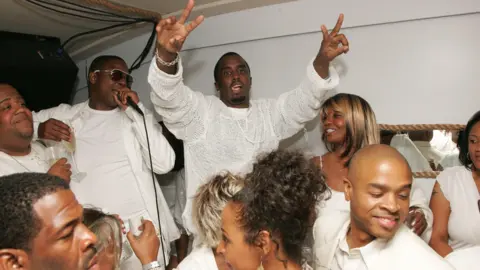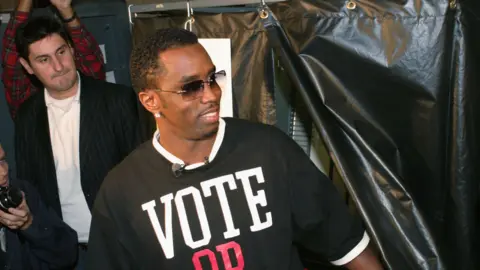In the Los Angeles area, the rapper lived on what has become known as Beverly Hills’s most expensive street.
The high fences allow celebrities to hide from prying eyes. Hugh Hefner’s Playboy mansion sits a few doors down.
The towering gates of Mr Combs’ estate have flaming torches burning day and night.
Neighbours told the BBC they often called police over his parties.
A freedom of information request by the BBC has revealed that officers were dispatched to parties at the P Diddy mansion 14 times over seven years.
On a street where discretion and privacy are of the utmost importance, no-one wished to be named, but neighbours described privately to the BBC what they witnessed, saying they were fed up and disturbed by what they saw.
“For six or seven years it was just parties, parties, parties,” one neighbour said, adding she saw females at all hours “coming out and sitting down on the street, they didn’t know where they were”.
She said they appeared “lost” and “their underwear was showing”.
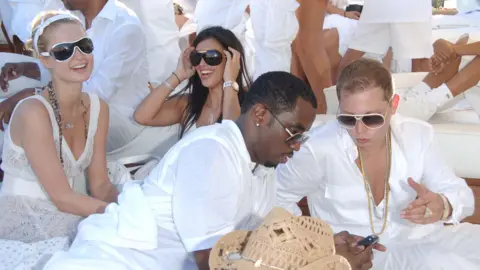
Celebrities like Paris Hilton and Kim Kardashian were among those in attendance at the 2006 White Party event
Mr Combs’s mansion in Beverely Hills was one of several venues he used to host his annual “White Party”, a flagship event which he held from 1998 to 2009.
He began the parties in New York’s exclusive Hamptons area with a strict all-white dress code, bringing together East Hampton’s old-money elite and the rising stars of hip hop.
Mr Combs once described the parties as a way to break down racial and generational barriers.
But the hottest party of the year was a “facade” that allowed “sinister” conduct, a recent lawsuit alleges.
In a lawsuit filed this week, a man – who was 16 years old at the time – described the thrill of getting to attend Mr Combs’s first “White Party” in 1998. Walking into the Hamptons mansion, he saw celebrities and entertainment executives left and right. In the lawsuit, he said he believed the party could open doors to a music career.
He said he was on his way to the bathroom when he ran into the rapper. They started talking and then moved to another, more private area. That’s when Mr Combs said the teen had the right “look” and he could turn anyone into a star, the lawsuit states.
Then things took a turn. Mr Combs abruptly ordered the then-teenage boy to drop his pants so that Mr Combs could examine and touch him, the lawsuit alleges.
According to the lawsuit, Mr Combs said it was “a rite of passage” and “the route to becoming a star”. It also claims that he said it was a way for him to prove himself, asking the teen: “Don’t you want to break into the business?”
At least two other lawsuits centre on the parties.
Former adult film star Adria English claimed she was “groomed into sex trafficking over time” after working at multiple White Party events, where she alleges the alcohol was laced with drugs. Another lawsuit, filed anonymously this week by a man, makes allegations about a 2006 White Party. He said in the lawsuit that he was working security at the event, where drinks were allegedly laced with drugs, and said he was raped by Mr Combs.
More than a dozen civil lawsuits in total have been filed accusing the music mogul of assaults, rape and sexual extortion. In these lawsuits, both men and women say they were coerced or forced into sex, either by Mr Combs or those in his entourage. Others say they obliged because they were intimidated by Mr Combs and the power he held in the entertainment industry. Some described having their careers derailed or opportunities taken from them when they did not cave to Mr Combs’s whims.
Mr Combs’ legal team has dismissed the lawsuits as “clear attempts to garner publicity”. In response to this story, a spokesperson for the rapper told BBC News that allegations of wrongdoing at his notorious parties were unfounded.
“Sean Combs’ white parties and other events were iconic, a true convergence of hip-hop, Hollywood, and Black excellence,” the statement reads.
“It’s disappointing to see the media and social commentators twist these cultural moments into something they were not. Shaming celebrities who attended, taking video clips and photos out of context, and trying to link these events to false allegations is simply untrue.”
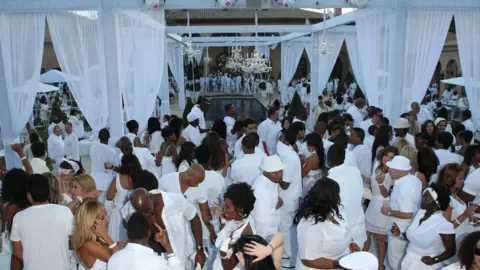
Mr Combs’s 2007 “White Party” in East Hampton, New York, was attended by celebrities including pop star Mariah Carey, musician Tommy Lee and producer Russell Simmons
Singer Cassie, who dated the rapper off-and-on for nearly a decade starting in 2007, accused the mogul in a lawsuit of controlling every aspect of her life, forcing her to take excessive amounts of drugs, have sex with other men, beating her for years and threatening her – and those in her circle – when she tried to leave the relationship.
In a lawsuit – which started an avalanche of accusations against the rapper – the singer said while dating Mr Combs she realised he had a “tremendously loyal network” that would do anything he asked.
“She recognized that she was powerless, and that reporting Mr Combs to the authorities would not alter Mr Combs’s status or influence but would merely give Mr Combs another excuse to hurt her,” the lawsuit stated.
Cassie, whose full name is Casandra Ventura, said at one point after she attempted to leave Mr Combs, his record label threatened “her single would not be released if she did not answer Mr Combs’s phone calls”, the lawsuit states.
Lawyers for Mr Combs have again denied the allegations, saying in a statement to the BBC earlier this week that he “has never sexually assaulted anyone – adult or minor, man or woman”.
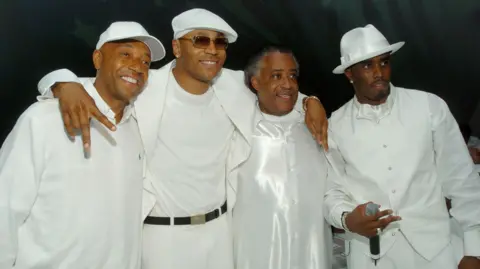
At the 2004 White Party, the guest list included music producer Russell Simmons, rapper LL Cool J and Rev Al Sharpton
‘Courage is contagious’
While various lawsuits detail alleged sexual assaults at parties held at Mr Combs’s properties, so-called “Freak-off” parties at hotel rooms appear to be a focus for federal authorities. The Department of Justice charged him with racketeering conspiracy, sex trafficking and transportation to engage in prostitution in a 14-page indictment last month.
Prosecutors have accused Mr Combs of recording sex acts during “Freak Offs”, which federal authorities describe as days-long sex parties involving multiple sex workers.
The indictment alleged that Mr Combs and his associates booked hotel rooms and stocked them with narcotics like ketamine, lubricant, extra linens and lighting so that they could record the orgies.
During the “Freak Offs,” Mr Combs allegedly “hit, kicked, threw objects at victims”, which led to injuries that would sometimes take weeks to heal, the court documents state.
According to the indictment, participants were allegedly coerced with drugs and threats to remain “obedient and compliant”. Afterwards, those involved would take IV fluids to recover, prosecutors allege.
Ms Ventura’s lawsuit, filed in November 2023 – almost a year before his indictment in New York – includes graphic details of these alleged “Freak-Off” parties. The lawsuit states Mr Combs would host these events weekly in hotels in New York and Los Angeles, flying in sex workers, supplying drugs that included ecstasy, cocaine and ketamine and forcing the singer to perform sex acts.
During a raid on Mr Combs’s Los Angeles and Miami mansions, law enforcement officers seized AR-15-style guns, large-capacity magazines, thousands of bottles of lube and baby oil.
Mr Combs’s arrest and the fallout surrounding his career has sparked hope among activists and survivors of sexual violence that his case could drive meaningful change within the music industry.
Gloria Allred, a prominent women’s rights lawyer who has defended a number of women throughout the #MeToo movement, believes the world is finally seeing a “reckoning” in the music industry.
She’s representing Thalia Graves, who alleges she was drugged and violently raped by the rapper in 2001. She said she was threatened by Mr Combs and did not speak out, fearing he would “ruin her life”, Allred said.
But Ms Allred told the BBC she thinks the fallout from Diddy’s arrest is far from over.
“Courage is contagious,” she said.
And prosecutors and lawyers for the growing list of Mr Combs’s accusers have hinted there is more to come.
“Combs did not do this all on his own,” Damian Williams, US Attorney for the Southern District of New York, said. “He used his business and employees of that business and other close associates to get his way.”
The investigation into the case is still open, authorities say.
As Mr Combs left his most recent court appearance in a beige prison jumpsuit, he mouthed to his family “I love you” and repeatedly put his hands to his heart, making a prayer sign.
As the hearing ended, a group of fans huddled by the courtroom doors on their tiptoes hoping to catch sight of him and show support for the rapper.
For his former assistant, the media storm that now surrounds the rapper is not without a hint of irony.
“He wanted to make himself the most famous person in the world, and ironically, now he is,” Mr Shuter said.
Christal Hayes contributed reporting to this story.
